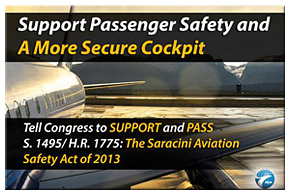 |
|
|
 ALPA Pilots Press DOT Secretary for Level Playing Field ALPA Pilots Press DOT Secretary for Level Playing Field
ALPA pilots stood front and center with a call for the U.S.
government to level the playing field for U.S. airlines as
U.S. Secretary of Transportation Anthony Foxx addressed the
Aero Club of Washington at a luncheon today. Capt. Moak was
invited to join the secretary at the head table.
During the Q&A following Secretary Foxx’s formal remarks,
Capt. Jud Crane (Delta), a member of the Delta MEC
Government Affairs Committee, asked, “How can the Department
of Transportation help level the playing field for U.S.
carriers and their employees who are facing competition from
state-owned, state-subsidized airlines who are exploiting
perceived loopholes in Open Skies agreements?”
Read more. |
|
Latest FAA Interpretations of Part 117
The FAA has just issued another Part 117 legal
interpretation dealing with diversions (de
Cubas Interpretation). When a need for a diversion
arises after takeoff, that diversion does not count as an
additional flight segment and there is no change to the
number of flight segments used to determine the applicable
FDP limit using Table B or C to Part 117. However, a planned
fuel stop that is known prior to takeoff would not be
treated as a diversion and would count as an additional
flight segment and require a new FDP calculation.
The February 20, 2014, ALPA FASTread accidently
reversed two Part 117 interpretations. We apologize for the
confusion. Here are the accurate attributions:
The FAA has issued two Part 117 interpretations. The
first (Edwards
Interpretation) clarifies that the fitness for duty must
be certified for each flight segment, and the flightcrew
member cannot certify fitness for the entire FDP when he or
she first reports for duty. The second (Healy
Interpretation) provides that the 12-hour notice
requirement for pilots on long-call reserve applies only
when the pilot is assigned an FDP that begins before and
operates into the WOCL. |
|
New Reps Learn the Ins and Outs of ALPA
Recently elected ALPA pilot leaders have gathered this week
for the Association’s annual Leadership Training Conference.
Nearly 70 pilots from 16 airlines—approximately a third of
the Association’s Board of Directors—are learning about what
it takes to effectively serve as local council officers and
the many products, templates, and services the Association
provides to help them better manage their responsibilities.
ALPA president Capt. Lee Moak spoke to the conference
attendees about the many strengths of the Association and
why it’s important for airline pilots to work together. “We
need to focus on the 95 percent of the things we have in
common,” he said, noting that because we come together as
one union, “ALPA is the advocate for airline pilots.”
Moak then shared a top 10 list of priorities pilot reps
should consider to maintain their authority and credibility
as they manage their council affairs.
Read more about the Leadership Training Conference. |
|
 It’s All About the Kids It’s All About the Kids
On February 18, the
Delta Pilots Charitable Fund allocated $13,000 to help
groups helping kids in real need in four ways: the Special
Needs Schools of Gwinnett, the L.A. Police Athletic League
and Cadet Program, and the children of the LAX TSA officer
slain in the line of duty last year. Since its inception,
the DPCF has granted more than $1 million to more than 50
children’s charities. |
|
One Level of Safety for All Pilots Now: Pass the Safe Skies Act
ALPA safety representatives attended the National
Transportation Safety Board (NTSB) investigative hearing
into UPS Flight 1354, an all-cargo flight which crashed on
approach to Birmingham-Shuttlesworth International Airport
in Birmingham, Ala., on August 14, 2013.
Pilot fatigue emerged as a focus area during the
investigative hearing. Investigative materials from the NTSB
hearing discussed crew scheduling and pairing for UPS pilots
Captain Cerea Beal Jr. and First Officer Shanda Fanning.
While the first part of the pairing through the accident
flight was consistent with the new flight- and duty-time
regulations, FAR Part 117, this was only coincidence.
Because of the loophole in Part 117, UPS, like all cargo
carriers, is not required to create schedules consistent
with the improvement in safety provided by these
science-based standards and programs. The FAA erroneously
excluded cargo from the new flight- and duty-time
regulations, and ALPA has been working diligently to correct
this error with the passage of legislation—the Safe Skies
Act—which would include cargo in the new rest rules.
Read More. |
|
Support the Saracini Aviation Safety Act
Captain Lee Moak sent a
letter to members of Congress urging support for H.R.
1775, the Saracini Aviation Safety Act of 2013.
In 2001, Congress mandated the installation of reinforced
cockpit doors on most commercial aircraft as the first step
toward preventing another 9/11-style breach of the cockpit.
Airlines are required to use procedures to protect the
cockpit when the reinforced door is opened during flight for
pilots’ meals, restroom use, and other reasons. To provide
better security, secondary barriers were developed to block
access to the cockpit whenever the cockpit door is open
during flight. Voluntary airline industry movement toward
adopting secondary barriers began in 2003, but commitment to
deploying these devices has since waned. The Saracini
Aviation Safety Act is a bipartisan bill that simply
fulfills the intent of Congress from more than a decade ago
to make cockpits more secure. ALPA is asking all pilots to
tell their representatives to cosponsor this bill today.
ALPA members can write their representatives using our Call
to Action system
here! |
|
ALPA Responds to NAI’s Request to DOT for Foreign Air Carrier Permit
The Air Line Pilots Association Int’l (ALPA) joined forces
with the Transportation and Trades Department of the AFL-CIO
and the European Cockpit Association in filing a response to
the Department of Transportation (DOT) requesting that the
agency deny Norwegian Air International (NAI) a foreign air
carrier permit that would allow it to fly in the United
States. The filing argues that NAI seeks to establish itself
as an Irish carrier to avoid Norway’s labor and other social
laws, and new claims the company has made to justify its
request are unsubstantiated.
“DOT is charged with encouraging fair wages and working
conditions and ensuring that U.S. air carriers have a strong
competitive position in the global marketplace,” said Capt.
Lee Moak, president of ALPA. “NAI’s business scheme does not
pass the test and is inconsistent with both directives,
therefore the application should be rejected.”
Read full release here. |
|
ALPA-PAC Announces New Club Level
Last week, the ALPA-PAC Steering Committee officially
announced the creation of a new PAC level. The
Behncke Circle recognizes ALPA’s rich heritage of
serving pilot members since 1931. The circle is named after
ALPA’s founder, Dave Behncke, who prioritized political
action. This distinction is for those contributors who are
following in his footsteps by reaching $1,000 in
contributions over a calendar year ($83.34/month). Just as
Behncke did as he worked to build and expand our union, the
members of this club know the necessity of having a
well-funded, well-organized political presence in
Washington, D.C.
You can join the Behncke Circle here.
The local representatives at UAL Council 33 (DEN)
immediately responded by becoming the very first council to
have 100 percent of its elected leaders enrolled in the
Behncke Circle. Captain Vince Zagarella, First Officer RJ
Wolf, and incoming Secretary-Treasurer Steve Knopf are all
part of the inaugural Behncke Circle class. Congratulations
and a special note of thanks goes out to Council 33 for
their tremendous leadership as the PAC fights to create a
pilot-partisan future.
The descriptions of the Air
Line Pilots Association PAC are not a solicitation to
contribute to the PAC. Only ALPA members, ALPA executives,
and senior administrative and professional staff personnel,
and their immediate family members living in the same
household are eligible to contribute to ALPA-PAC. ALPA-PAC
maintains and enforces a policy of refusing to accept
contributions from any other source. ALPA members may learn
more about ALPA-PAC and about contributing to ALPA-PAC by
entering the members-only portion of this website. |
|
|
|
|
ALPA
represents nearly 50,000 pilots at 31 airlines in the
United States and Canada.
Visit us online at
www.alpa.org. |
|
|
|


![]()